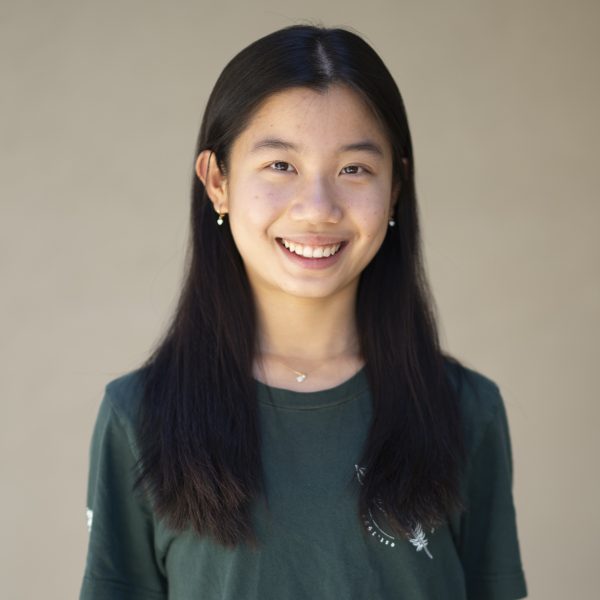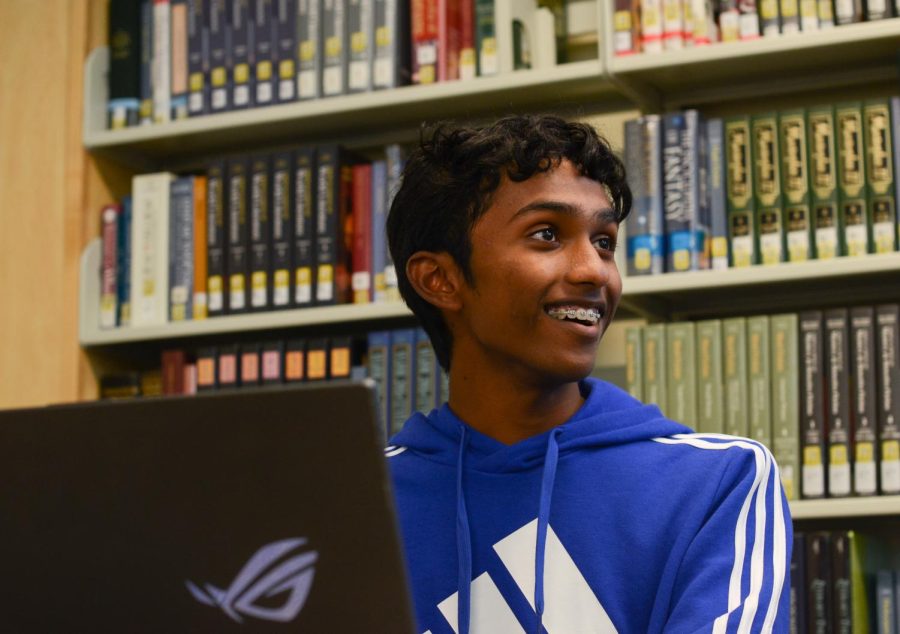Humans of Harker: Archives and algorithms
Saahil Thoppay seeks knowledge while bringing light to others
“With programming, after working for a while, I could see my entire project come to life. Everything happened at once. Once I could see it all happening, it was just a big sense of accomplishment that I couldn’t really find anywhere else,” Saahil Thoppay (12) said.
A symphony of clattering keyboards echoes through the room, punctuated by occasional friendly banter. A group of students sit in a row facing their laptops, each with their eyes glued to the screen in front of them but their ears attuned to the voices around them. This is the library classroom, where Saahil Thoppay (12) spends most afternoons delving into various computer programs.
Saahil’s programming expertise stems from a variety of projects and endeavors. He participates in team contests with his friends, regularly contributes to public repositories on GitHub, spends his summers teaching younger students how to code and works on developing his own flight simulator in his free time. Vikram Mani (12), who met Saahil when he joined Harker in sixth grade, noted how Saahil’s sincere attitude towards programming led him to experiences that drove his growth as a coder.
“Saahil has a lot of genuine interest in computer science,” Vikram said. “When someone is interested in a subject like that, they don’t need to do competitions or put it on a resume to feel fulfilled. Saahil’s fulfilled by just the act of coding.”
As a ninth grader, Saahil questioned whether he should devote his time to computer science or to broadening his horizons through other activities. Ultimately, he was drawn to the immense gratification that came with each program he wrote.
“With programming, after working for a while, I could see my entire project come to life,” Saahil said. “Everything happened at once. Once I could see it all happening, it was just a big sense of accomplishment that I couldn’t really find anywhere else.”
While this fulfillment drives Saahil to continuously explore new applications of computer science, he acknowledges that he often encounters bugs when programming that require close examination to resolve. Saahil initially saw debugging as a more frustrating aspect of programming, but he realized that the persistence the practice instilled in him extended to other parts of his life.
“If you put your mind to something and you can get through all the problems, the outcome will be even more gratifying,” Saahil said. “In programming, if you’re dealing with a bunch of bugs, you know that if you can get through it, you’re [eventually] going to really enjoy using your program.”
Upper school computer science teacher Anu Datar, who taught Saahil in the Compilers and Interpreters class in his junior year, immediately recognized his determination as one of his outstanding qualities. She recalls how Saahil sought to improve his compiler beyond what was required for the class and insisted on fixing errors in his code independently.
“Saahil didn’t want me to give him any solutions,” Datar said. “He would ask questions for clarity, but if I said, ‘Let me show you how to do it,’ he would never be happy. He always said, ‘No, don’t tell me how to do it; don’t tell me how I should approach it. But am I on the right track?’”
Computer science now constitutes a significant portion of Saahil’s life both inside and outside the classroom, but his interest in the activity first began in middle school. He fondly remembers spending his lunches and afternoons on programming and robotics in middle school computer science teacher Sam Linton’s classroom. Saahil credits teachers like Linton and Datar with inspiring his love for learning.
“Having teachers that let students explore on their own is what makes learning really appealing to me,” Saahil said. “Every year, I’ve had at least one really good teacher who has helped me learn beyond what’s in the textbooks.”
Exceptional teachers also sparked Saahil’s enthusiasm for history. His curiosity in the subject started to develop in middle school, when he noticed how his teachers would allow him and his classmates to explore various topics that caught their attention, regardless of whether they were part of the standard curriculum.
In his free time, Saahil enjoys watching historical documentaries, browsing Wikipedia articles and having debates with his friends about historical events. To him, one of the most captivating facets of history is how lessons from the past connect to situations in the present and influence decisions for the future.
“One of the biggest aspects of history is that you can learn [from] all the mistakes that have been made in the past, and you can relate them to what’s happening in current events,” Saahil said. “Coronavirus is one example. We’ve had pandemics in the past, and we’ve seen how they should be handled. It’s interesting how we still made some of the same mistakes.”
While Saahil’s friends admire his intellect and his constant pursuit of knowledge, they appreciate the joy that he brings to every conversation most of all. John Cracraft (12), who met Saahil while programming in Linton’s room in middle school, describes this joy as an aspect of Saahil’s personality that has remained constant throughout the years.
“When Saahil comes into a room, you know something fun is going to happen,” John said. “Even if you’re having the most depressing day, he always knows what to say to bring a smile to your face.”
For Saahil, the change in environment that came with his transition from one school to another sparked a desire to reach out to others. Taking inspiration from other members of the Harker community, Saahil always seeks opportunities to uplift those around him.
“I’m always trying to help all my friends with their homework, and I’m a big team player,” Saahil said. “This was something I had to learn over time because at my past schools, it was more about completing your tasks and getting the best possible score. When I joined Harker, there was a lot more collaboration in the classes, and that pushed me to really want to help others out.”

Ella Yee (12) is the co-editor-in-chief of Harker Aquila, and this is her fourth year on staff. This year, Ella hopes to continue bonding with the journalism...


















![“[Building nerf blasters] became this outlet of creativity for me that hasn't been matched by anything else. The process [of] making a build complete to your desire is such a painstakingly difficult process, but I've had to learn from [the skills needed from] soldering to proper painting. There's so many different options for everything, if you think about it, it exists. The best part is [that] if it doesn't exist, you can build it yourself," Ishaan Parate said.](https://harkeraquila.com/wp-content/uploads/2022/08/DSC_8149-900x604.jpg)




![“When I came into high school, I was ready to be a follower. But DECA was a game changer for me. It helped me overcome my fear of public speaking, and it's played such a major role in who I've become today. To be able to successfully lead a chapter of 150 students, an officer team and be one of the upperclassmen I once really admired is something I'm [really] proud of,” Anvitha Tummala ('21) said.](https://harkeraquila.com/wp-content/uploads/2021/07/Screen-Shot-2021-07-25-at-9.50.05-AM-900x594.png)







![“I think getting up in the morning and having a sense of purpose [is exciting]. I think without a certain amount of drive, life is kind of obsolete and mundane, and I think having that every single day is what makes each day unique and kind of makes life exciting,” Neymika Jain (12) said.](https://harkeraquila.com/wp-content/uploads/2017/06/Screen-Shot-2017-06-03-at-4.54.16-PM.png)








![“My slogan is ‘slow feet, don’t eat, and I’m hungry.’ You need to run fast to get where you are–you aren't going to get those championships if you aren't fast,” Angel Cervantes (12) said. “I want to do well in school on my tests and in track and win championships for my team. I live by that, [and] I can do that anywhere: in the classroom or on the field.”](https://harkeraquila.com/wp-content/uploads/2018/06/DSC5146-900x601.jpg)
![“[Volleyball has] taught me how to fall correctly, and another thing it taught is that you don’t have to be the best at something to be good at it. If you just hit the ball in a smart way, then it still scores points and you’re good at it. You could be a background player and still make a much bigger impact on the team than you would think,” Anya Gert (’20) said.](https://harkeraquila.com/wp-content/uploads/2020/06/AnnaGert_JinTuan_HoHPhotoEdited-600x900.jpeg)

![“I'm not nearly there yet, but [my confidence has] definitely been getting better since I was pretty shy and timid coming into Harker my freshman year. I know that there's a lot of people that are really confident in what they do, and I really admire them. Everyone's so driven and that has really pushed me to kind of try to find my own place in high school and be more confident,” Alyssa Huang (’20) said.](https://harkeraquila.com/wp-content/uploads/2020/06/AlyssaHuang_EmilyChen_HoHPhoto-900x749.jpeg)



